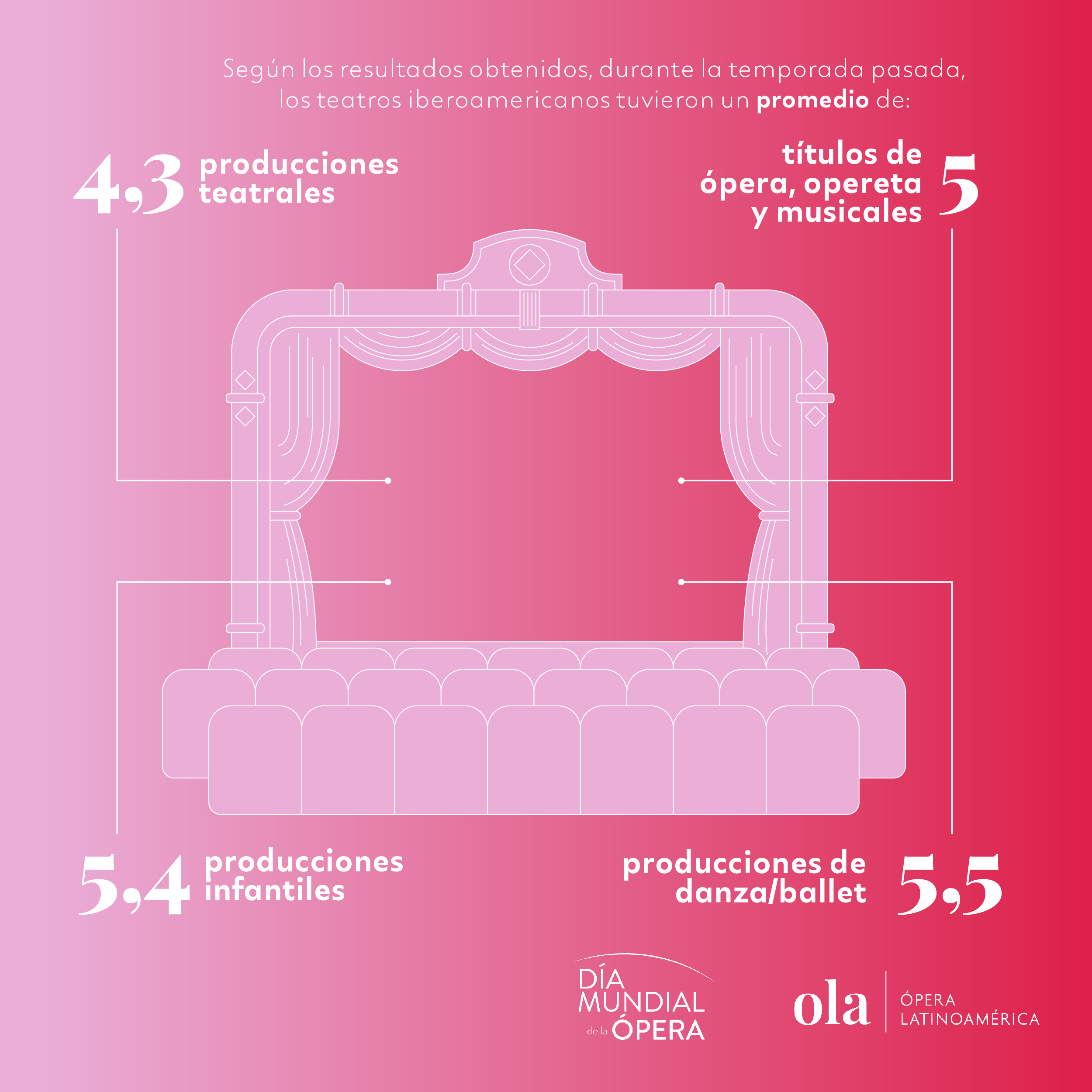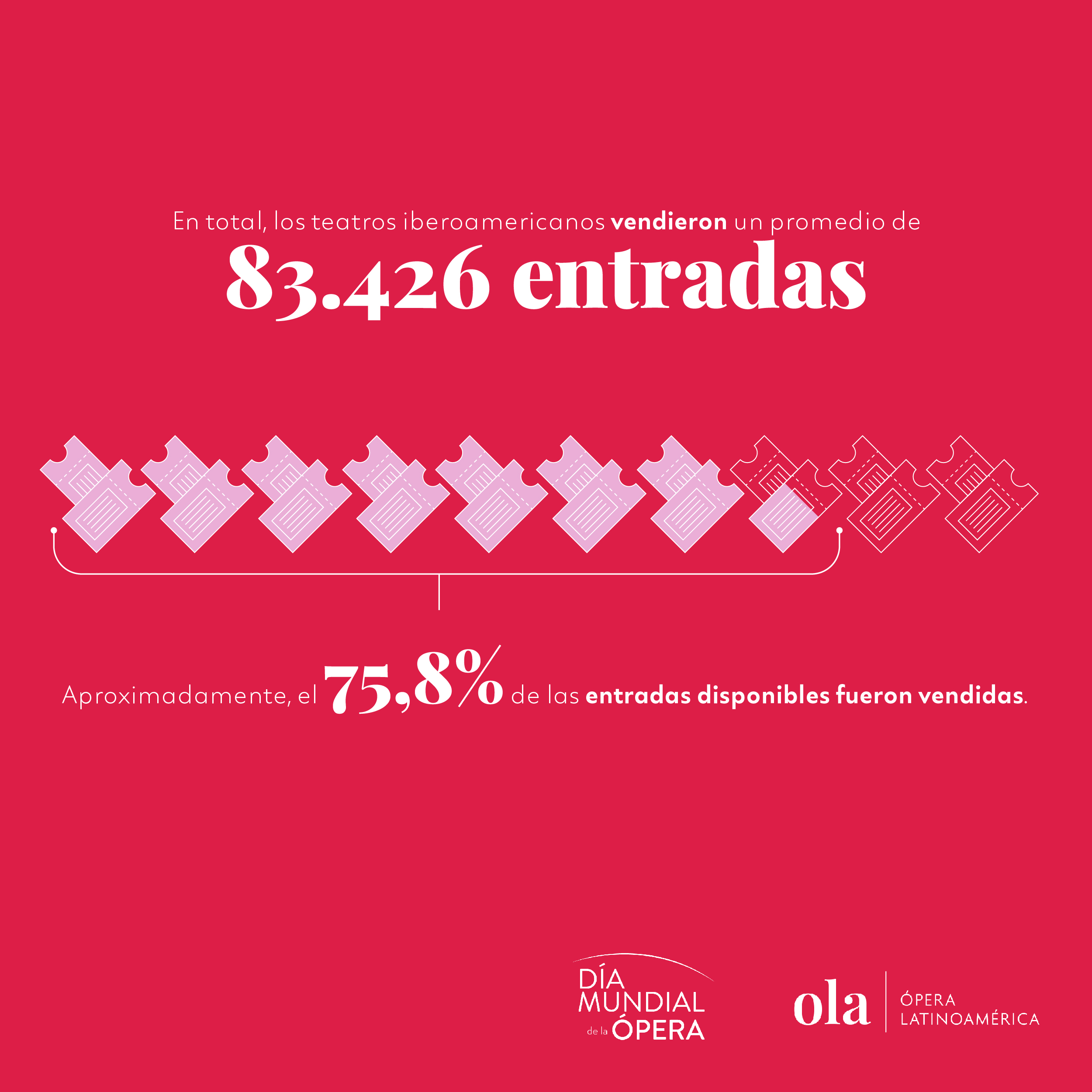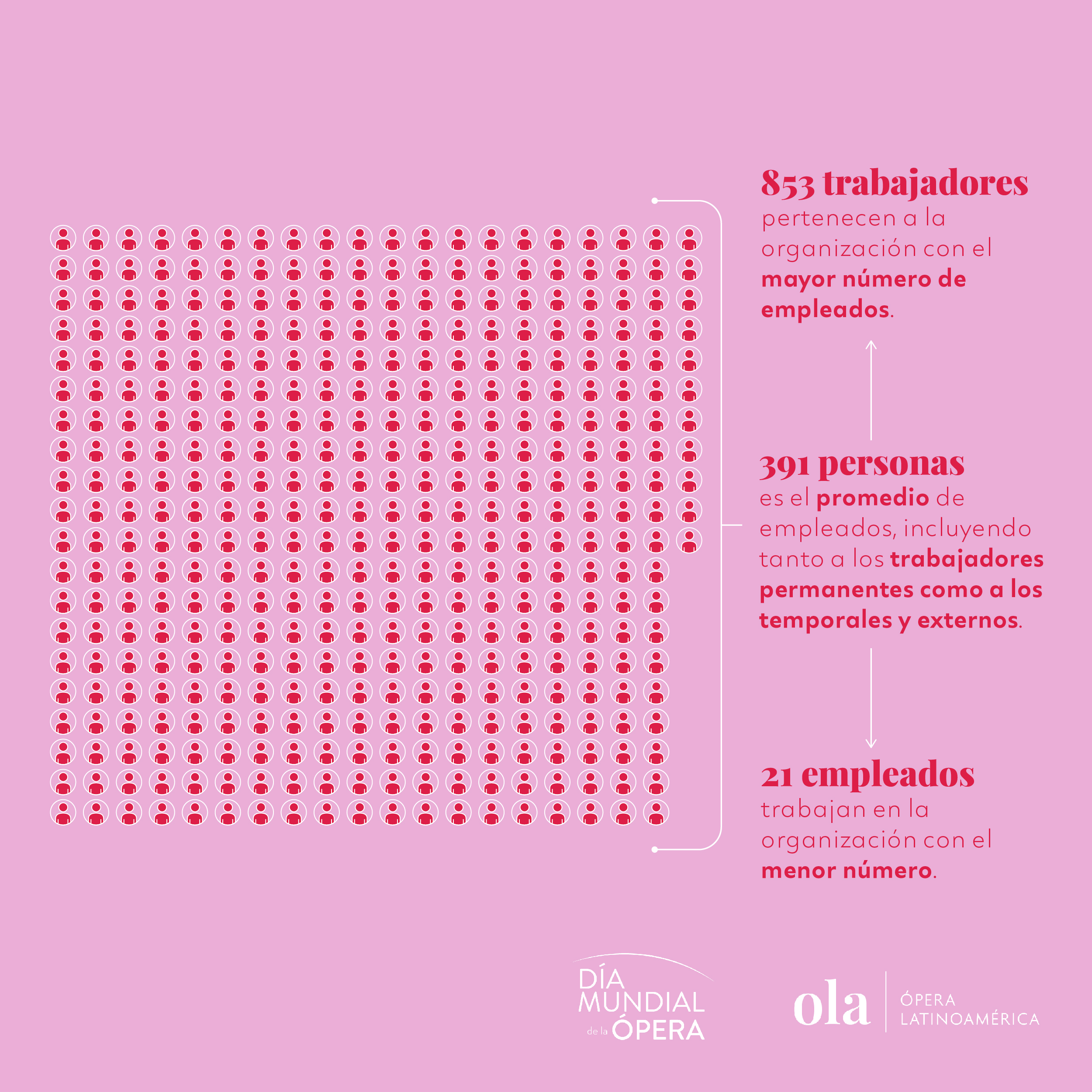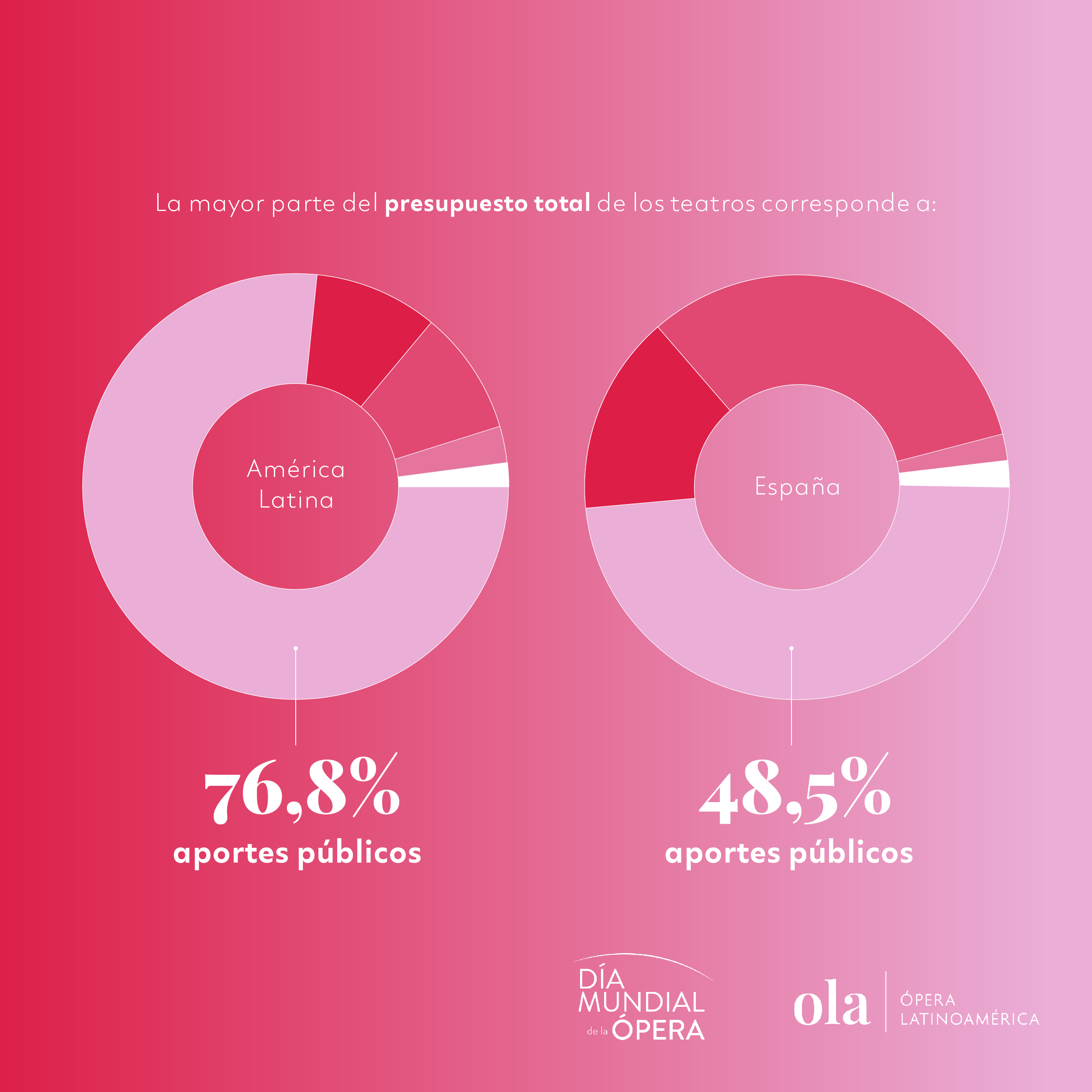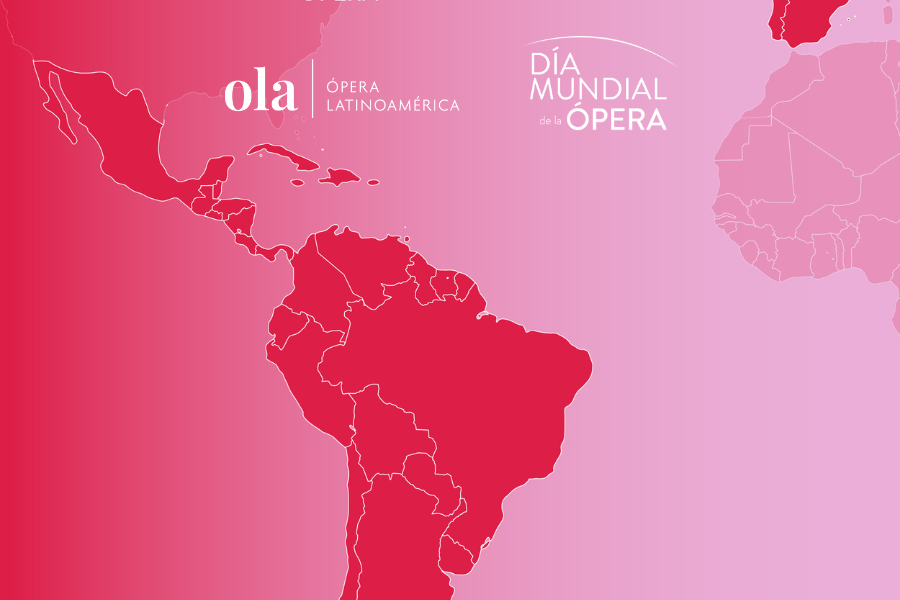Día Mundial de la Ópera 2023: Conoce el impacto positivo de los teatros

Como cada año, el 25 de octubre Ópera Latinoamérica (OLA) se suma a las celebraciones globales del Día Mundial de la Ópera, una fecha en la que aprovechamos de resaltar las contribuciones de la lírica a la sociedad en general. Este año, nos enfocamos en abogar por el trabajo que se realiza en los teatros y en todos y todas quienes aportan a la producción de los espectáculos. Es por eso que 22 teatros de la red de OLA respondieron una encuesta para conocer más de cerca el impacto positivo de la ópera en la sociedad y las comunidades. Conoce algunos de los resultados a continuación.
¿Cuántas personas trabajan, en promedio, en un teatro iberoamericano? ¿Cuántas producciones se programaron durante la temporada pasada? ¿Cuántos públicos asistieron a los teatros? ¿Cómo se traducen estas preguntas en las contribuciones de los teatros de ópera a la sociedad en general?
Cada 25 de octubre, Ópera Latinoamérica, junto a las organizaciones Opera Europa y Opera America, se une a las celebraciones globales del Día Mundial de la Ópera. En esta fecha conmemoramos el nacimiento de los compositores Georges Bizet y Johan Strauss, pero también aprovechamos de resaltar el impacto positivo que tienen los teatros y la lírica en general en las comunidades alrededor del mundo.
Este 2023, el foco estuvo en abogar por el trabajo que se realiza en los teatros y, en particular, el trabajo de todos y todas quienes aportan a la producción y creación de los espectáculos, ya sean de ópera, teatro o danza.
“Desde OLA creemos que es crucial contar con datos y una medición sostenida en el tiempo para conocer más de cerca la realidad de las instituciones que forman parte de esta red. En esa línea, este 25 de octubre presentamos los resultados de una encuesta respondida por 22 teatros de la red de OLA que muestra, a través de cifras, el aporte de la actividad cultural a la sociedad a nivel artístico, social y productivo. Invitamos a quienes quieran sumarse a este estudio —aún exploratorio— a que compartan sus experiencias y podamos, en conjunto, construir este conocimiento sobre el impacto positivo de su trabajo”, comenta Alejandra Martí, directora ejecutiva de Ópera Latinoamérica.
La recuperación de los teatros en la etapa de postpandemia puede observarse en la cantidad de espectáculos programados y entradas vendidas. Según los resultados obtenidos, durante la temporada pasada, los teatros iberoamericanos presentaron un promedio de 5 títulos de ópera, opereta y musicales, 5,5 producciones de danza/ballet, 4,3 producciones teatrales y 5,4 producciones infantiles. En esta temporada, las organizaciones encuestadas vendieron un promedio de 83.426 entradas, es decir, aproximadamente el 75.86% de las entradas disponibles fueron vendidas.
En cuanto al impacto económico y laboral, las 16 instituciones que respondieron esta pregunta emplean, en promedio, a 391 personas en sus diferentes áreas. La organización con el mayor número de empleados tiene 853 trabajadores, mientras que la que tiene el menor número tiene 21.
Del total de los teatros encuestados, el 50% posee talleres propios de escenografía y el 40% de vestuario. En cuanto a los cuerpos estables, el 37,5% cuenta con ensambles de solistas internos, coros y orquestas propias, mientras que el 25% cuenta con compañía propia de ballet o danza.
Con respecto al financiamiento, del total de respuestas recibidas, el 56.8% del presupuesto total de los teatros corresponde a aportes públicos. Mirando un poco más de cerca, las respuestas recibidas por teatros latinoamericanos indican que el 76,8% de su presupuesto total corresponde a aportes públicos, mientras que para los teatros españoles, este aporte corresponde al 48,5% del presupuesto total.
Como parte de la campaña anual del Día Mundial de la Ópera, el mismo cuestionario también fue aplicado a teatros de otras redes como la europea, lo que permitirá contar con una sistematización de datos a nivel global.
El próximo martes, 31 de octubre, a las 12:00 horas (Chile), Ópera Latinoamérica presentará a los miembros de su red un completo informe de la encuesta junto a Celia Grau, coordinadora de abogacía de Opera Europa.
Cómo participar del Día Mundial de la Ópera 2023
- Si trabajas en teatros, compártenos tu día a día utilizando los hashtags #DíaMundialDeLaÓpera y #WorldOperaDay
- Etiquétanos en Instagram con el @operalatinoamerica



